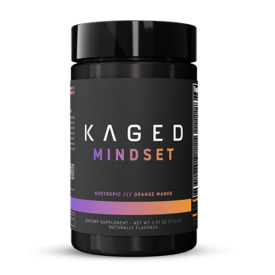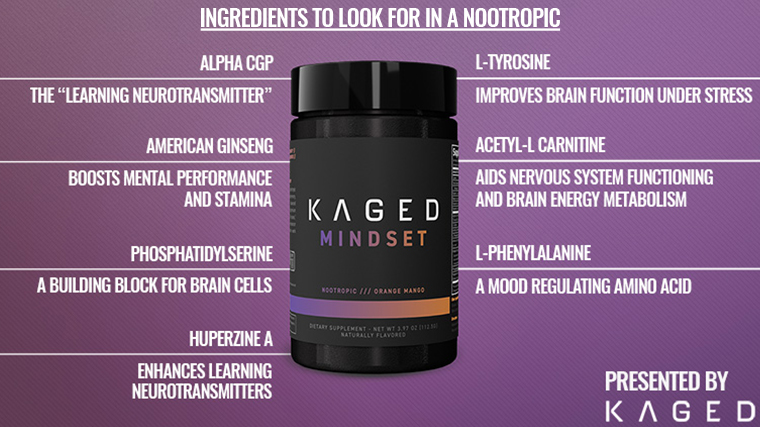Nootropics are a relative newcomer in a booming supplement market, promising benefits and enhancements to those seeking a cognitive edge. However, they’ve gained popularity quickly and are now firmly positioned as a top contender vying for prime space in your supplement regimen.
At their best, nootropics can do everything from improving your attention and focus to even enhancing your working memory. However, nootropic supplements are not all created equal.
The trick is, knowing what to look for in a top-tier nootropic supplement and how to choose one that best suits your goals. We’ll discuss the proven benefits of nootropics, featured in Kaged’s Mindset® supplement, and how they can boost performance, motivation, focus, mood, and cognition. This means enhanced productivity, higher-quality output on your creative work, and lasting, dialed-in work sessions where everything seems to go right.

KAGED Mindset uses high quality, science-backed ingredients to aid your focus, energy, and mental stamina in and out the gym. BarBend readers can save 15% off their order with code "barbend".
Editor’s Note: The content on BarBend is meant to be informative in nature, but it should not be taken as medical advice. When starting a new training regimen and/or diet, it is always a good idea to consult with a trusted medical professional. We are not a medical resource. The opinions and articles on this site are not intended for use as diagnosis, prevention, and/or treatment of health problems. They are not substitutes for consulting a qualified medical professional.
What Are Nootropics?
Nootropics are a class of supplements broadly defined as any compound that can enhance cognitive performance and mental functioning. There are two types of nootropics: lab-created and naturally found, such as herbs.
Nootropics are also called “smart drugs” because they can boost memory, motivation, attention, focus, and creativity. Research has also found some nootropics can improve symptoms of depression, anxiety, and general mood. (1)(2) Nootropics show many promising benefits for people with impairments and healthy individuals looking for a brain boost.
Some of the most well-studied and evidence-backed nootropics found in Kaged Mindset include:
- Alpha CGP: a preferred source of choline which helps release acetylcholine, the “learning neurotransmitter” (3)
- American Ginseng: an adaptogenic herb used for thousands of years that may boost mental performance and stamina (4)
- Phosphatidylserine: a building block for functional brain cells (5)(6)
- Huperzine A: prevents the loss of acetylcholine to enhance the learning neurotransmitter (7)
- L-tyrosine: an amino acid that helps produce catecholamines and neurotransmitters involved in brain function under stress (8)
- Acetyl-l carnitine: an amino acid that plays a role in nervous system functioning and brain energy metabolism (9)
- L-phenylalanine: a mood regulating amino acid (10)
[Related: Kaged Pre-Kaged Elite Pre-Workout Review]
The Benefits of Nootropics
The incredible power of increased attention, focus, mood, and motivation that nootropics provide can be felt in all aspects of your life.
Finding the motivation to push through a grueling workout or even to get to the gym can be tough. And staying focused and motivated to plow through a challenging project for work can zap the willpower of even the most dedicated employee.
While no supplement is a miracle drug, scientific literature has shown that nootropics may provide a boost for those days (months, years) when keeping on task and performing your best requires a little push. Here are some of the top benefits of nootropics you should know.
Motivation
Motivation can be elusive and hard to come by, especially with busy lives packed wall to wall with projects, deadlines, appointments, and commitments. Nootropics such as Alpha-Glycerylphosphorylcholine (Alpha GCP) and others can boost motivation and help you conquer your to-do list and training sessions.
A randomized, placebo-controlled human study published in Nutrients found subjects who took nootropic supplements experienced increased motivation, especially at night— often the most challenging time to get motivated for many people when the couch is calling. Interestingly, the subjects felt their motivation increased throughout the two weeks of supplementation. Those taking the placebo did not experience these effects. (3)
Another study published in the Journal of the International Society of Sports Medicine compared nootropic supplements with traditional caffeine-packed pre-workout. The researchers found that nootropics can be just as effective at boosting motivation and other cognitive functions as caffeine, but without any jitteriness or other unwanted side effects. (11)
Focus and Attention
One of nootropics’ most touted benefits is an increased ability to focus. Distraction reigns in today’s tech-based society with constant interruptions from notifications, emails, and Zoom calls. While no one can expect to be hyper-focused all hours of the day, a few hours of “flow” can help you smash through critical tasks during your work week. (12) In the gym, more focused attention on your working muscles and effort level can vastly improve your results. (13)
Nootropics may allow you to keep on task, despite mental fatigue. (1) Some compounds keep your brain topped up with the energy it needs to feel fresh and focused, improving your ability to stick to task. Other compounds assist in upregulating hormones like serotonin, dopamine, and noradrenaline that keep you sharp and productive. (14)
Memory
Nootropics are making waves as a memory enhancer both in the medical community and for the general population. Promising research shows neuroprotective effects from certain compounds that may even combat dementia and age-related cognitive decline. (15) Research shows improved memory recall, spatial memory, and working memory.
Some of these compounds work by preventing the breakdown of acetylcholine, which is crucial for learning and memory. They can also support brain cell mitochondria, which means your brain stays fueled with energy for a more optimal functioning memory. As if that weren’t enough, nootropics can boost brain antioxidants to protect brain cells from damage and increase cell longevity. (16)
Stress Tolerance
Stress is a tricky beast. It can stem from physical, mental, and emotional roots, but your body responds to stress similarly regardless the cause. So, if you’re stressed out at work and then try to hit PRs in the gym, you may be pouring too much stress on an already taxed system.
When this happens, stress hormones can increase, including catabolic ones that prevent muscle gain (or even decrease muscle tissue) and wreak havoc on your overall health. Everything from your sleep to your libido can be affected, piling on more stress, and kicking off a vicious cycle. Nutrition and supplementation can play a huge role in warding off stress, and nootropics are one way to shield yourself from the worst of it.
Research published in Nutrients reveals that nootropics can help you stay sharp and think clearly even during bouts of stress, which typically leave your brain feeling scrambled. (1) Other nootropic compounds can ward off stress hormones, helping your brain resist their damaging effects. (6)
[Related: What Top Lifters Want in a Pre-Workout Stack]
Mood
The researchers who published on stress hormones in Nutrients found that certain nootropic compounds can also boost mood in people with depression. (14) They can also boost brain levels of serotonin, which has long been linked with better moods and less risk of depression. Study participants who consistently take some nootropics report better overall mood after a few weeks. (1)
Productivity
Putting all this research together, it’s clear that nootropics can promote productivity. While it’s likely not healthy to be “all systems go” all the time, everyone can use a productivity boost now and again.
If you can focus, pay attention to detail, be motivated to complete tasks, and feel good doing it, there’s no surprise that productivity might skyrocket from these effects. Moreover, safe and effective nootropic compounds are a much better way to go than some of the more risky methods used by college students and executives looking for an edge. (17)
Power Output and Muscular Strength
Interestingly, the ways nootropics act on the brain can extend to other physical actions, including power output and muscular strength. The Journal of the International Society of Sports Nutrition states that Alpha-CPC boosts peak force production during exercise. When a supplement has the potential to boost exercise performance, it’s called ergogenic.
Using a randomized, placebo-controlled, crossover design, seven men with at least two years of resistance training experience took Alpha-GPC or a placebo 90 minutes before training. Results showed the men who took Alpha-GPC could produce 14% more explosive power during bench pressing than the placebo group. They also had a lower RER (respiratory exchange ratio), which means they weren’t struggling as hard to recover their breath after their sets. (18) Similar results have been found when testing vertical jump explosiveness. (19)
Researchers believe this effect may be due to an increase in human growth hormone (HGH) from Alpha-GPC. HGH is an anabolic hormone that helps build muscle and decrease fat tissue. This makes Alpha-GPC both a nootropic and ergogenic aid.
What to Look For in a Nootropic Supplement
When choosing a nootropic supplement, not all options are created equal. Knowing what to look for is the key to getting your money’s worth and achieving the effects you are hoping for.
Effective Ingredients
First and foremost, you want to ensure your chosen nootropic contains elite ingredients that have been well-studied and are positioned in the scientific literature as effective and safe. Some of the most extensively researched compounds include the ones mentioned above: Alpha-GPC, phosphatidylserine, huperzine A, and acetyl-l carnitine.
Kaged Mindset contains these ingredients, plus others that work to support brain function and general health. These additional supports include vitamin C for antioxidant and immune system benefits, B complex for energy, and Ioniplex®, a fulvic acid mineral complex that contains trace minerals like calcium, zinc, chromium, copper, and iron.
Third-Party Testing
In the world of supplementation, there is little regulation or overwatch. Companies that stand by their products and provide third-party testing should be the top contenders for space on your supplement shelf. Kaged Mindset uses third-party testing to ensure the ingredients are pure and potent.
Caffeine Free
While caffeine can be a nootropic and workout enhancer, there are several caveats. First, the energy you might get from caffeine essentially borrows from your energy levels later. Caffeine highs usually result in a crash-and-burn effect, which isn’t helpful if you still have stuff to do after the effects wear off.
Secondly, caffeine can cause jittery, nervous, restless, or even anxious energy that isn’t smooth or controlled like the kind you can get from other nootropics. Kaged Mindset skips the caffeine and offers a hefty dose of Alpha-GPC, shown in the literature to work just as well without the jitters. (20)
Thirdly, caffeine can cause some people to experience gastrointestinal issues (that’s a delicate way of describing it) that can interfere with your workout or flow state. And no one wants to be interrupted by a lengthy bathroom visit during peak performance.
Caffeine can also interrupt the quantity and quality of sleep. It has a 6 to 8-hour half-life, with some people being affected more than others. Even if you can fall asleep immediately after a double espresso, it doesn’t mean that sleep is restorative. This means you’re likely better off taking caffeine in the early morning hours exclusively for best results, limiting the flexibility of it as a nootropic. (21)
Last, you build a tolerance to caffeine. While you might feel great taking caffeine today, if you take a lot of it daily, you won’t get the heightened energy and focus you did the first time.
Mindset comes in a caffeine and caffeine-free version, so whether you’re looking for a clean boost of caffeine or need a non-caffeinated version later in the day that won’t impact your sleep, Kaged has you covered.

KAGED Mindset uses high quality, science-backed ingredients to aid your focus, energy, and mental stamina in and out the gym. BarBend readers can save 15% off their order with code "barbend".
Final Word
Nootropics are an excellent choice if you want to supercharge your focus, increase attention, boost motivation, and sharpen your memory. Kaged Mindset is packed with evidence-backed powerhouse ingredients that help your brain function optimally, all with a caffeine-free (optional), smooth ride of mental energy. What’s more, third-party testing for potency and purity ensures you’re getting the best bang for your buck.
Take Kaged Mindset about 30 minutes before your work or gym session for the best results. When using it for workout enhancement, you might notice improved mind-muscle connection due to enhanced focus ability, increased motivation, and power output. Taking it before a workflow session could help you power through a project with improved attention to detail and clarity of thought.
References
- Malík, M., & Tlustoš, P. (2022). Nootropics as Cognitive Enhancers: Types, Dosage and Side Effects of Smart Drugs. Nutrients, 14(16). https://doi.org/10.3390/nu14163367
- Suliman, N. A., Mat Taib, C. N., Mohd Moklas, M. A., Adenan, M. I., Hidayat Baharuldin, M. T., & Basir, R. (2015). Establishing Natural Nootropics: Recent Molecular Enhancement Influenced by Natural Nootropic. Evidence-based Complementary and Alternative Medicine : ECAM, 2016. https://doi.org/10.1155/2016/4391375
- Tamura, Y., Takata, K., Matsubara, K., & Kataoka, Y. (2021). Alpha-Glycerylphosphorylcholine Increases Motivation in Healthy Volunteers: A Single-Blind, Randomized, Placebo-Controlled Human Study. Nutrients, 13(6). https://doi.org/10.3390/nu13062091
- Scholey, A., Ossoukhova, A., Owen, L., Ibarra, A., Pipingas, A., He, K., Roller, M., & Stough, C. (2009). Effects of American ginseng (Panax quinquefolius) on neurocognitive function: An acute, randomised, double-blind, placebo-controlled, crossover study. Psychopharmacology, 212(3), 345-356. https://doi.org/10.1007/s00213-010-1964-y
- Monteleone P, Beinat L, Tanzillo C, Maj M, Kemali D. Effects of phosphatidylserine on the neuroendocrine response to physical stress in humans. Neuroendocrinology. 1990;52(3):243-248. https://doi.org/10.1159/000125593
- Komori, T. (2015). The Effects of Phosphatidylserine and Omega-3 Fatty Acid-Containing Supplement on Late Life Depression. Mental Illness, 7(1). https://doi.org/10.4081/mi.2015.5647
- Callizot, N., Campanari, M., Rouvière, L., Jacquemot, G., Henriques, A., Garayev, E., & Poindron, P. (2021). Huperzia serrata Extract ‘NSP01’ With Neuroprotective Effects-Potential Synergies of Huperzine A and Polyphenols. Frontiers in Pharmacology, 12. https://doi.org/10.3389/fphar.2021.681532
- Kühn, S., Düzel, S., Colzato, L. et al. Food for thought: association between dietary tyrosine and cognitive performance in younger and older adults. Psychological Research 83, 1097–1106 (2019). https://doi.org/10.1007/s00426-017-0957-4
- Nie, L., Liang, J., Shan, F., Wang, B., Mu, Y., Zhou, X., & Xia, Q. (2021). L-Carnitine and Acetyl-L-Carnitine: Potential Novel Biomarkers for Major Depressive Disorder. Frontiers in Psychiatry, 12. https://doi.org/10.3389/fpsyt.2021.671151
- Akram M, Daniyal M, Ali A, et al. Role of phenylalanine and its metabolites in health and neurological disorders. In: Surguchov A, ed. Synucleins – Biochemistry and Role in Diseases. IntechOpen; 2020. https://doi.org/10.5772/intechopen.83648
- Shields, K.A., Silva, J.E., Rauch, J.T. et al. The effects of a multi-ingredient cognitive formula on alertness, focus, motivation, calmness and psychomotor performance compared to caffeine and placebo. J Int Soc Sports Nutr 11 (Suppl 1), P45 (2014). https://doi.org/10.1186/1550-2783-11-S1-P45
- Tops, M., & Bakker, A. B. (2021). The Neuroscience of the Flow State: Involvement of the Locus Coeruleus Norepinephrine System. Frontiers in Psychology, 12. https://doi.org/10.3389/fpsyg.2021.645498
- Calatayud J, Vinstrup J, Jakobsen MD, et al. Importance of mind-muscle connection during progressive resistance training. Eur J Appl Physiol. 2016;116(3):527-533. https://doi.org/10.1007/s00421-015-3305-7
- Smeland OB, Meisingset TW, Borges K, Sonnewald U. Chronic acetyl-L-carnitine alters brain energy metabolism and increases noradrenaline and serotonin content in healthy mice. Neurochem Int. 2012;61(1):100-107. https://doi.org/10.1016/j.neuint.2012.04.008
- Ha GT, Wong RK, Zhang Y. Huperzine a as potential treatment of Alzheimer’s disease: an assessment on chemistry, pharmacology, and clinical studies. Chem Biodivers. 2011;8(7):1189-1204. https://doi.org/10.1002/cbdv.201000269
- Xing SH, Zhu CX, Zhang R, An L. Huperzine A in the treatment of Alzheimer’s disease and vascular dementia: A meta-analysis. Evid Based Complement Alternat Med. 2014;2014:363985. https://doi.org/10.1155/2014/363985
- Sharif, S., Guirguis, A., Fergus, S., & Schifano, F. (2021). The Use and Impact of Cognitive Enhancers among University Students: A Systematic Review. Brain Sciences, 11(3). https://doi.org/10.3390/brainsci11030355
- Ziegenfuss, T., Landis, J. & Hofheins, J. Acute supplementation with alpha-glycerylphosphorylcholine augments growth hormone response to, and peak force production during, resistance exercise. J Int Soc Sports Nutr 5 (Suppl 1), P15 (2008). https://doi.org/10.1186/1550-2783-5-S1-P15
- Marcus, L., Soileau, J., Judge, L. W., & Bellar, D. (2016). Evaluation of the effects of two doses of alpha glycerylphosphorylcholine on physical and psychomotor performance. Journal of the International Society of Sports Nutrition, 14. https://doi.org/10.1186/s12970-017-0196-5
- Parker, A. G., Byars, A., Purpura, M., & Jäger, R. (2014). The effects of alpha-glycerylphosphorylcholine, caffeine, or placebo on mood, cognitive function, power, speed, and agility markers. Journal of the International Society of Sports Nutrition, 12(Suppl 1), P41. https://doi.org/10.1186/1550-2783-12-S1-P41
- Research I of M (US) C on MN. Pharmacology of Caffeine. National Academies Press (US); 2001. https://www.ncbi.nlm.nih.gov/books/NBK223808/

